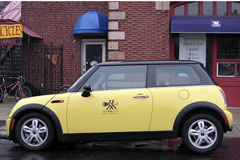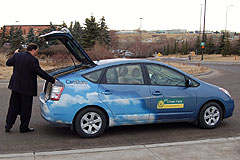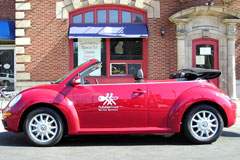With gasoline prices spiraling upwards, the cost of car ownership can put a major dent in the budget. Perhaps, your vehicle sits in the garage unused for days, sometimes weeks, without moving. Here it is deteriorating and depreciating while making monthly insurance payments and paying annual registration fees. If you live in a large metropolitan area parking may be an expensive problem. However, you like the convenience of a car versus public transportation when, for example, you want to visit family or friends who live in the suburbs, for a major shopping trip, or must travel to destinations where public transportation is inconvenient or not available.

The answer could be carsharing that provides most of the benefits of individual car ownership without the hassles. With carsharing, one or more vehicles are located in a convenient location for use by many motorists who belong to a carshare group. The costs and troubles of purchase, ownership and maintenance are the responsibility of the carshare operator. Group members pay an hourly or daily fee for use that usually includes gasoline and insurance. Some carshare programs also charge a per-mile charge. There is usually a nominal initial fee and monthly or annual administrative fee.
The typical carsharing program works like this. Vehicles are parked in several locations around an urban area. They are within walking or bicycling distance, or can be reached by taxi or mass transit. When you want to use a car, you reserve it either by phone or online. Choose a pickup time, planned length of use, pickup location, and even model vehicle wanted.

When you are ready to pickup the car, go to the location and use a "smart card" to open the door and start the car. Typically, a sophisticated system prevents anyone else opening the car during the time you have reserved it. All you do is hold the card to the windshield and the doors will unlock. Some of the smaller carshare groups may used a simple lockbox and a manual login/logout reservation system.
When you are done with the car, bring it back to the same reserved parking location. Members are responsible for leaving the vehicles on time, in the agreed parking area, clean and in good condition for the next user. If a vehicle is not returned at the scheduled time, a high fee may be charged, since it may interfere with other drivers' reservations.
The carsharing concept is far from a new idea. It dates back to the late 1940s in Europe. It is extremely popular there being available in many European cities Today there are more than six hundred cities in the world where people can carshare. Unfortunately, it is currently available in the U.S. in only about 24 locales, mainly larger cities and several university communities.

Many of the carshare programs require applicants to be over 21 years of age and have a valid driver's license. However, since programs are becoming popular on college campuses, Flexcar is reducing this to 18-plus and Zipcar has cooperative programs with several universities. Indeed, most of the smaller carshare programs have been organized as student and faculty cooperatives. Besides eliminating the costs and hassles of owning a car on campus, unlike rental car companies that will rent only to those over 25, carshare vehicles are available to younger drivers.
Carsharing does not compete with, or substitute for public transport. It performs an entirely different function, and is really a complement to scheduled public transport. Studies have shown carshare users are much more likely to be users of both conventional public transport as well as more apt to use bicycles and walking.
There are other benefits to carsharing like being able to drive a new, fuel-efficient car rather than an old, gas guzzler with questionable reliability. The Toyota Prius hybrid is a popular carshare model. Other include Scions, MINIs and New Beetles. Some offer minivans for carrying a group, pickups for moving day or a convertible for a drive in the country. Having to plan a trip in advance means you are more likely to ask, "Is this trip really necessary?"
For more information on carsharing, including starting a group in your community,www.carsharing.net is a good starting point.
LARGER CARSHARING PROGRAMS
Zipcar
Boston, New York, Washington, Chapel Hills, Toronto, Chicago, Minneapolis, San Francisco
www.zipcar.com
Flexcar
Atlanta, Los Angeles, Portland (OR), San Diego, San Francisco, Seattle, Washington (DC)
www.flexcar.com
City Car Share
San Francisco, Oakland, Berkeley (CA)
www.citycarshare.com
HOURCAR
Minneapolis-St. Paul
www.hourcar.org
I-GO
Chicago
www.igocars.org
PhillyCarShare
Philadephia
www.phillycarshare.com
Community Car
Madison (WI)
www.communitycar.com




